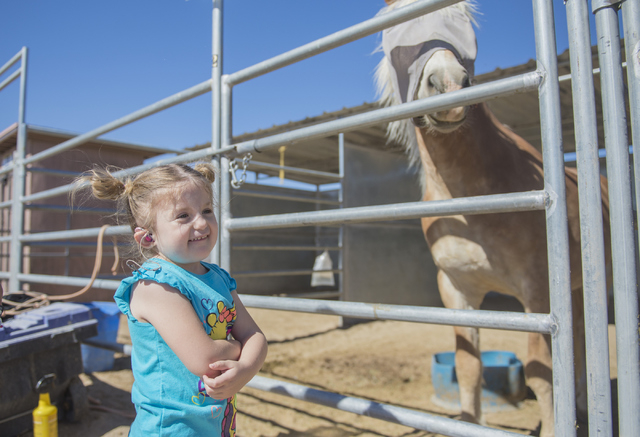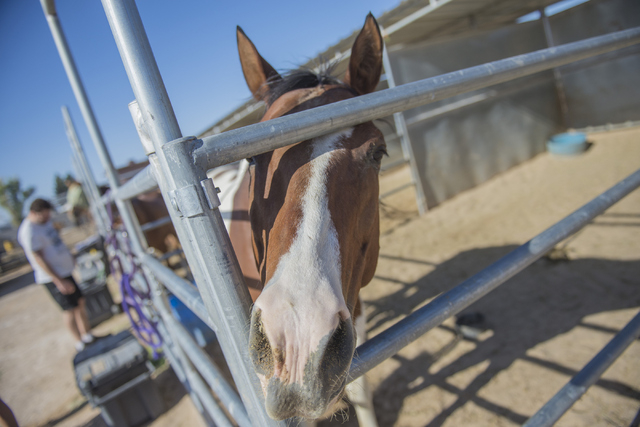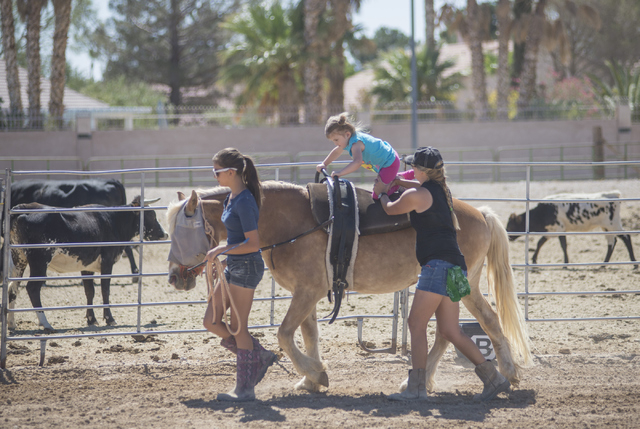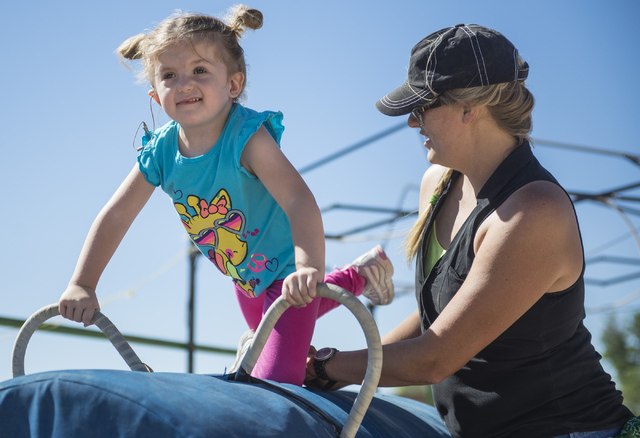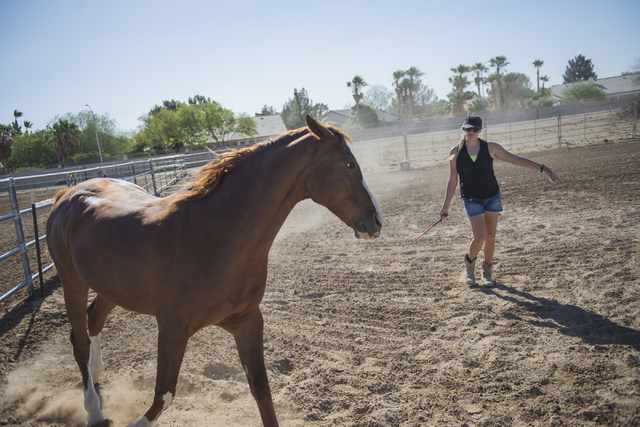Horseback riding more than just therapy for disabled students
The use of horses in therapy, also known as hippotherapy, has been widely used as an effective treatment for people with cognitive or physical disabilities.
AnnMarie DeGrace and Jolene Hugo, who teach riding at Talisman Farm in the northwest Las Vegas Valley, believe those with disabilities should not be limited to interacting with a horse for the sole purpose of therapy but rather also to attain riding skills to be able to participate in an all-inclusive sport.
“This, much like therapy, is effective for the children, but it gives them a sports aspect to it that simple hippotherapy does not provide,” Hugo said. “Since a lot of disabled children are unable to practice a normal sport, adaptive equestrian gives them the opportunity to do that and feel included and have fun at the same time.”
Hugo, who started horseback riding about eight years ago, said she fell in love with the idea of using horses for therapeutic riding and went back to school to study occupational therapy.
After graduating in 2010, she moved to Las Vegas and met DeGrace, who had worked with therapeutic riding in Massachusetts since 1995.
Both started to teach their own form of therapeutic riding, which they call adaptive equestrian, at Talisman Farm, 5771 W. Rosada Way, about two years ago. During their classes they teach children and adults with physical, cognitive or emotional challenges how to ride — either in classical or Western styles — and vault as they would any able-bodied person.
“My son can’t do any sports, but he can do adaptive equestrian,” said Michelle Jones.
Her son, Jackson, 13, has a physical disability and is unable to move his legs from the knees down.
“Riding is a sport he can do that gives him confidence, makes him like he has control over something and makes him physically stronger,” she said.
Jones said she has seen enthusiasm from her son in continuing with adaptive equestrian. Since he cannot run, she said being on the horse makes Jackson feel he has momentum. Riding has also strengthened his core and has been a positive experience for him because it has given him something special to participate in.
Jones said that because of Jackson’s disability, he is unable to participate in many activities other children his age enjoy. She said being able to participate in an actual sport has made him feel included.
“Even though there is a therapeutic component to adaptive equestrian, we are not focused on the child’s disability,” Hugo said. “Instead, we are focused on teaching them a skill and a sport that they can participate in as well as any other abled person.”
According to DeGrace, the benefit of therapeutic riding is that often those who have physical challenges are not able to move their body the way able-bodied people can, but when they are riding a horse, the animal mimics the back-and-forward moving motion of the body.
“That’s when the therapy part comes in, when you do therapeutic riding,” DeGrace said. “And with it also comes the benefit of learning riding skills, so that people can gain ability in a sport.”
Las Vegas resident Marc O’Brien, author of the therapeutic riding book “Special Person to Ride,” said the benefits of adaptive equestrian activities extend beyond exercise or riding skills.
“Riding a horse also allows a person to learn basic social skills and allows them to enjoy a caring environment where friendship, trust and love are elements that are experienced,” O’Brien said. “These basic lessons that an able-bodied person may take for granted are invaluable to someone who may not have all the opportunities others have in life.”
Even though the benefits of adaptive equestrian are extensive and both Hugo and DeGrace are properly licensed, therapeutic riding is not recognized by medical professionals and so is not covered by insurance.
The women have taught riding to people with a variety of disabilities, ranging from autism to attention deficit hyperactive disorder. But since adaptive equestrian is not covered by insurance, families have to pay for lessons out of pocket.
“That’s one of the reasons I applied for us to be a subordinate nonprofit with the American Vaulting Association,” DeGrace said. “That will allow us to get funding for different projects we have in mind.”
If accepted as a subordinate nonprofit, DeGrace and Hugo could apply for grant money for a climate-controlled indoor arena and raise money to hold competitions.
“It would be amazing to see Jackson compete because he doesn’t usually get to compete in anything,” Jones said. “It is such a positive feeling to see your kid do something that he gets confidence from. We would really love to see him compete.”
Additional funding would also help Hugo and DeGrace maintain their business, as they are now only breaking even. Nevertheless, even though the program is continually growing with approximately 15 lessons per week, both stated they would continue teaching adaptive equestrian mainly for their love of it.
“I love being around horses and kids. It makes therapy so much more meaningful,” Hugo said. “It is so worth it for me to do this because when you work with these kids, you really feel like you are making a difference. I would still do it even if I had a million bucks.”
For more information about Talisman Farm, visit talismanfarmlv.com.
Contact reporter Maria Agreda at magreda@reviewjournal.com or on Twitter at @mjfagre.



